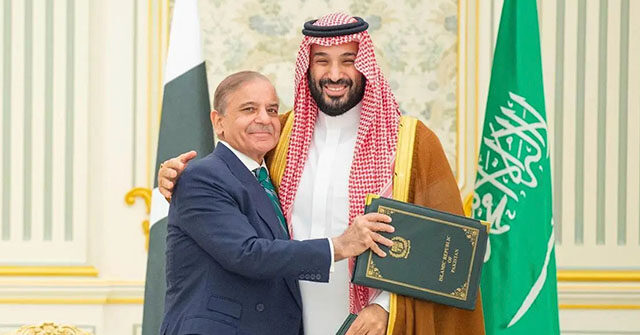Pakistani Defense Minister Khawaja Mohammad Asif on Thursday answered a lingering question about the new defense pact between his country and Saudi Arabia by confirming that Pakistan’s nuclear arsenal is covered by the agreement.
The Saudi-Pakistani pact, supposedly in the works for months but signed with great fanfare on Wednesday after Israel attacked Hamas leaders hiding in Qatar, troubled many security analysts because Pakistan has nuclear weapons.
The pact committed Saudi Arabia and Pakistan to treat an attack on either nation as an attack on both, in language similar to the North Atlantic Treaty Organization’s (NATO) mutual defense commitment. It was not immediately clear if this meant Pakistan would extend its nuclear umbrella to cover the Saudis, who are not exactly next-door neighbors.
Pakistan’s nuclear arsenal has been tacitly accepted by the international community for decades as a defense against rival India, which is also a nuclear power. India and Pakistan have skirmished several times, most recently in May 2025 after a terrorist attack India blamed on Pakistan, but the nuclear deterrent has helped to prevent these scuffles from escalating into all-out war.
Pakistan has been criticized in recent years, and was even sanctioned by the Biden administration, for developing long-range ballistic missiles that could be capable of delivering nuclear warheads over long distances.
Asif was directly asked during an interview on Thursday night if the defense pact with Saudi Arabia includes nuclear deterrence.
“Let me make one point clear about Pakistan’s nuclear capability: that capability was established long ago when we conducted tests. Since then, we have forces trained for the battlefield,” Asif replied.
“What we have, and the capabilities we possess, will be made available according to this agreement,” he stated.
Asif added that the defense pact was not specifically targeted at Israel.
“We have not named any country whose attack would automatically trigger a retaliatory response. Neither has Saudi Arabia named any country, nor have we,” he said.
“This is an umbrella arrangement offered to one another by both sides: if there is aggression against either party – from any side – it will be jointly defended, and the aggression will be met with a response,” he said.
Another concern about the Saudi-Pakistani agreement was that other countries might join, creating a web of mutual defense commitments that could explode into a regional war.
Asif confirmed that expanding the defense agreement was a real possibility.
“I can say the door is not closed to others,” he said.
In a separate interview in London, Pakistani Deputy Prime Minister Isaq Dar also said the agreement could expand.
“It is premature to say anything, but after this development, other countries have also expressed a desire for similar arrangements. Such things follow due process. Even with Saudi Arabia, it took several months to finalize,” Dar said.
The Diplomat on Friday warned of a “growing realization in Arab capitals regarding Pakistan’s military capabilities and its usefulness for their defense.”
The next in line to take advantage of Pakistan’s arsenal could be Qatar, followed by the United Arab Emirates (UAE). Pakistan, meanwhile, would like to build Middle Eastern support to present a more formidable front to India.
“The government was aware that this development, which formalizes a long-standing arrangement between the two countries, had been under consideration. We will study the implications of this development for our national security as well as for regional and global stability,” the Indian Foreign Ministry said crisply after Pakistan signed its deal with Saudi Arabia.
















